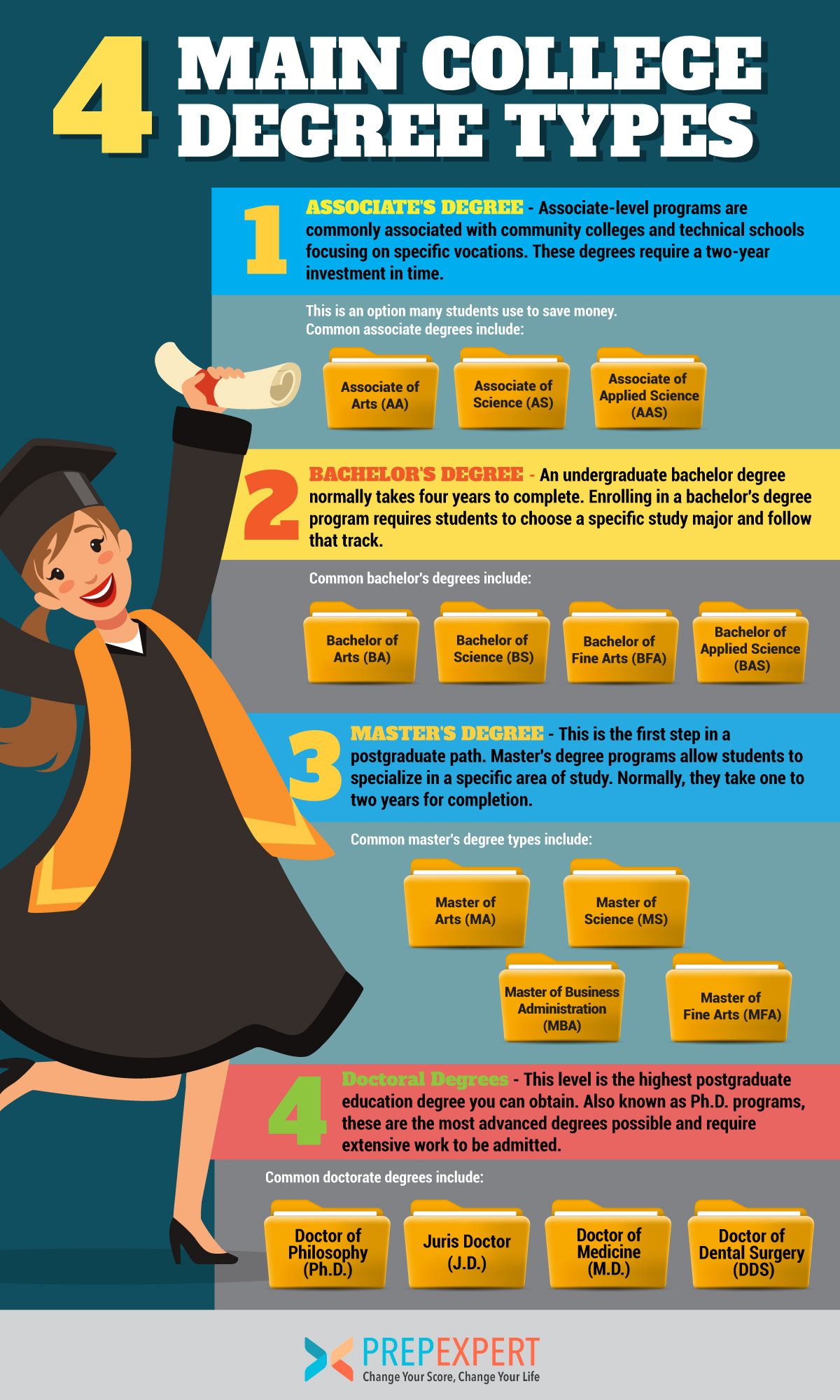The Four Main College Degree Types
How far do you want to go after high school? Do you want an associate’s degree? Do you see yourself eventually pursuing a doctorate? Before deciding, you need to know the different college degree types first.
Before deciding how far you want to go after high school, consider the different college degree types available.
Learn how to prepare for standardized tests with our year-round SAT prep and ACT prep courses today.
Associate’s Degree
These degrees cover two-year programs that provide training for entry-level jobs.
Associate-level programs are commonly associated with community colleges and technical schools focusing on specific vocations. These degrees require a two-year investment in time.
They’re great if you’re interested in specific vocations that don’t require additional training before entering the workforce.
Another benefit is that transferable associate programs let students complete general education credits and transfer them over to a four-year university or college.
This is an option many students use to save money. Common associate degrees include:
- Associate of Arts (AA)
- Associate of Science (AS)
- Associate of Applied Science (AAS)
If you’re looking to enter the workforce quickly or want to save money through credit transfer, an associate’s degree program is helpful.
Bachelor’s Degree
This degree type is the most common one at four-year institutions.
An undergraduate bachelor’s degree normally takes four years to complete. Enrolling in a bachelor’s degree program requires students to choose a specific study major and follow that track.
Common bachelor’s degree majors include:
- History
- Finance
- Biology
- Communications
- English
Bachelor degree recipients are theoretically qualified to work in either entry-level or management-level positions immediately, depending on their career field. More importantly, anyone looking to pursue graduate-level study must first obtain a bachelor’s degree.
Common bachelor’s degrees include:
- Bachelor of Arts (BA)
- Bachelor of Science (BS)
- Bachelor of Fine Arts (BFA)
- Bachelor of Applied Science (BAS)
Again, this route is common for most students either looking to pursue further education, or careers requiring more than associate’s degrees for entry.
Master’s Degree
This is the first step in a postgraduate path.
Master’s degree programs are postgraduate programs that allow students to specialize in a specific area of study. Normally, they take one to two years for completion.
However, unlike a bachelor’s program, master’s degree programs require more effort to get in than GPAs and SAT test scores. Enrolling in a master’s degree program requires meeting the basic prerequisites:
- Undergraduate degree
- Minimum GPA
- Graduate entrance exam acceptable score
The Graduate Record Examination (GRE) is a common entrance exam used by programs to gauge applicants. Also, once admitted, master’s degree candidates complete either a thesis or capstone project to graduate.
A master’s degree is helpful if you want to qualify for executive-level job positions. For example, an MBA has traditionally been seen as a gatekeeper for employees looking to advance significantly up the corporate ladder.
Moreover, if you want to pursue a doctorate, many programs require both bachelor’s and master’s degrees first. Common master’s degree types include:
- Master of Arts (MA)
- Master of Science (MS)
- Master of Business Administration (MBA)
- Master of Fine Arts (MFA)
Doctoral Degrees
This level is the highest postgraduate education degree you can obtain.
Doctoral degrees are the top of the mountain degree-wise. Also known as Ph.D. programs, these are the most advanced degrees possible and require extensive work to be admitted.
Most doctorate degree programs require applicants to already have a master’s degree but this rule isn’t universal. Other common requirements include submitting various standardized test scores and recommendation letters.
Once accepted into a program, expect to spend several years working towards your degree. Part of that work includes completing either a dissertation and/or a major research project.
Expect additional hours of hands-on work with real patients during residency for a medical-related doctorate. Ph.D. graduates are qualified to work in various high-level business or research positions, as well as teaching at the professor-level.
The most common doctorate degrees include:
- Doctor of Philosophy (Ph.D.)
- Juris Doctor (J.D.)
- Doctor of Medicine (M.D.)
- Doctor of Dental Surgery (DDS)
For more test strategy, college admissions, and scholarship application tips sign up for our FREE class happening right now!
College Degree Types FAQ
What is an associate’s degree?
Associate-level programs are commonly associated with community colleges and technical schools focusing on specific vocations. These degrees require a two-year investment in time. They’re great if you’re interested in specific vocations that don’t require additional training before entering the workforce.
What exactly is a bachelor’s degree?
An undergraduate bachelor’s degree normally takes four years to complete. Enrolling in a bachelor’s degree program requires students to choose a specific study major and follow that track.
What is a master’s degree?
Master’s degree programs are postgraduate programs that allow students to specialize in a specific area of study. Normally, they take one to two years for completion. However, unlike a bachelor’s program, master’s degree programs require more effort to get in than GPAs and SAT test scores.
How difficult are doctorate degrees to obtain?
Most doctorate degree programs require applicants to already have a master’s degree but this rule isn’t universal. Other common requirements include submitting various standardized test scores and recommendation letters. Once accepted into a program, expect to spend several years working towards your degree. Part of that work includes completing either a dissertation and/or a major research project.
